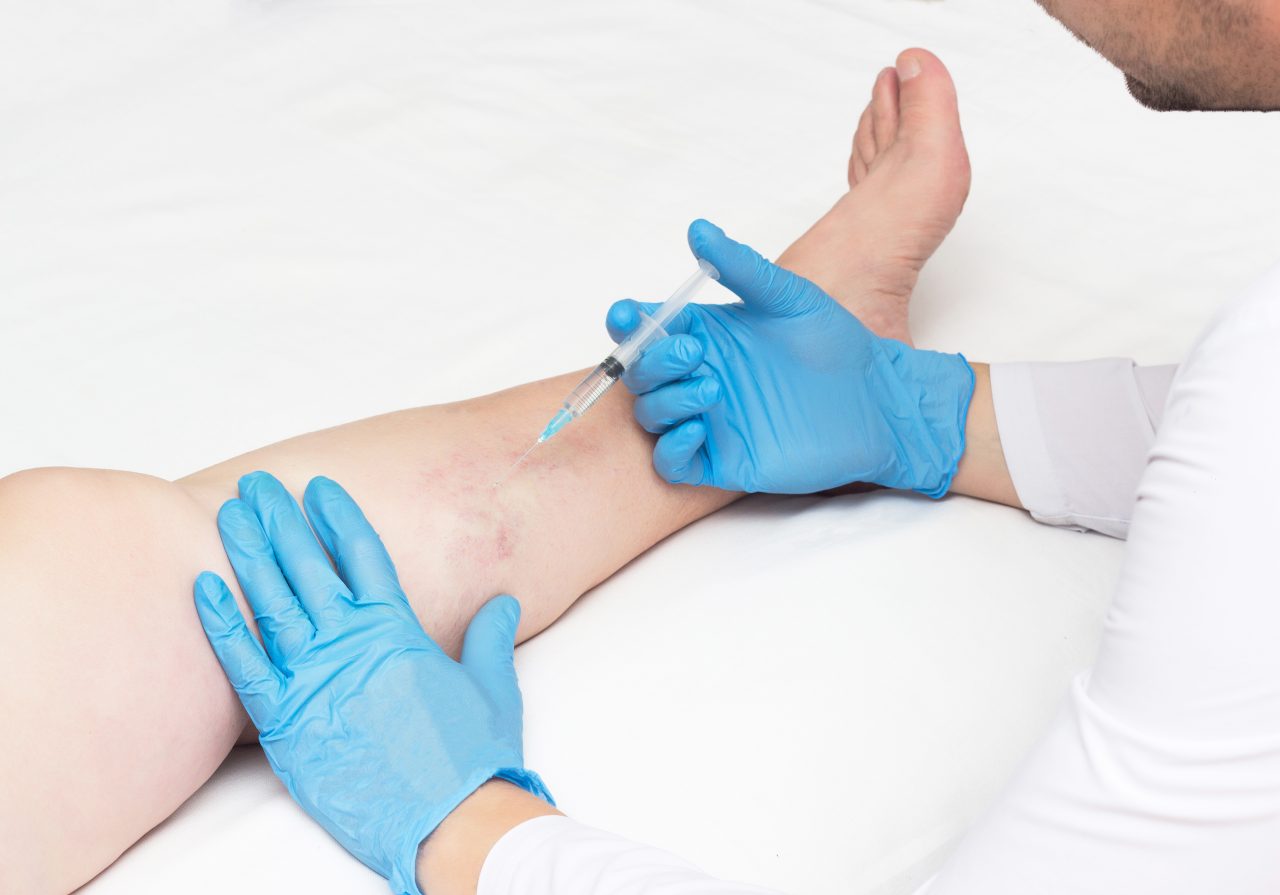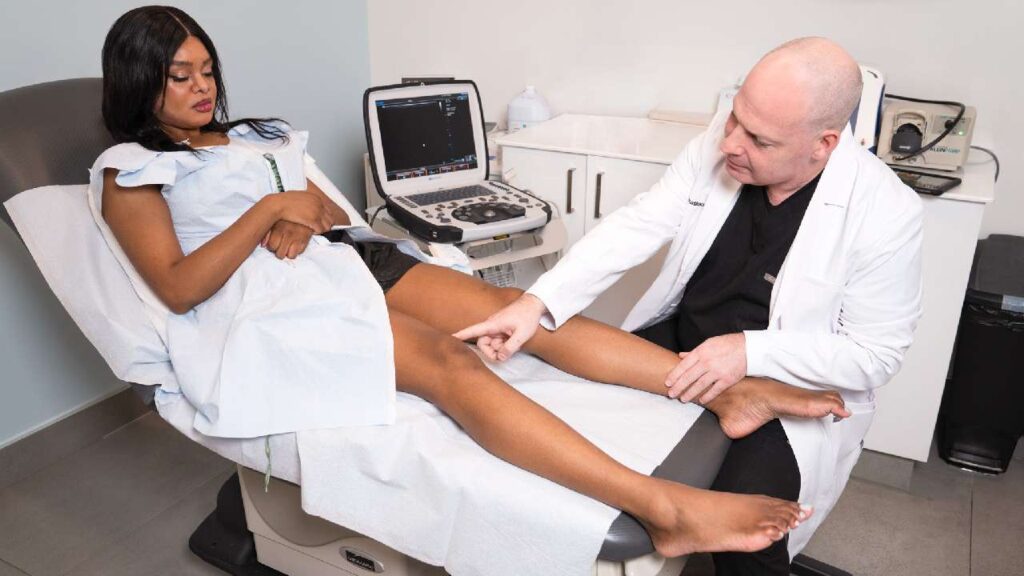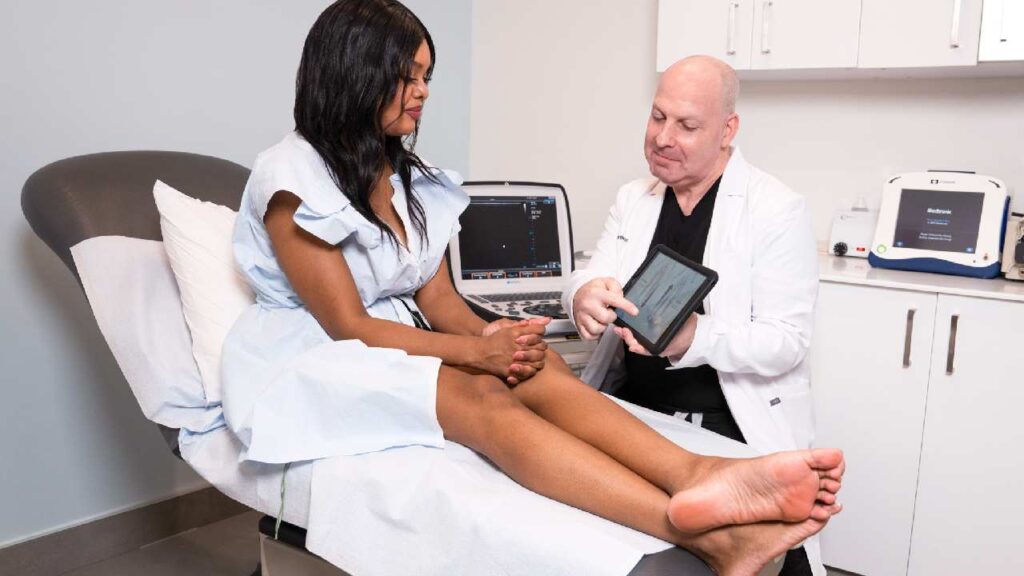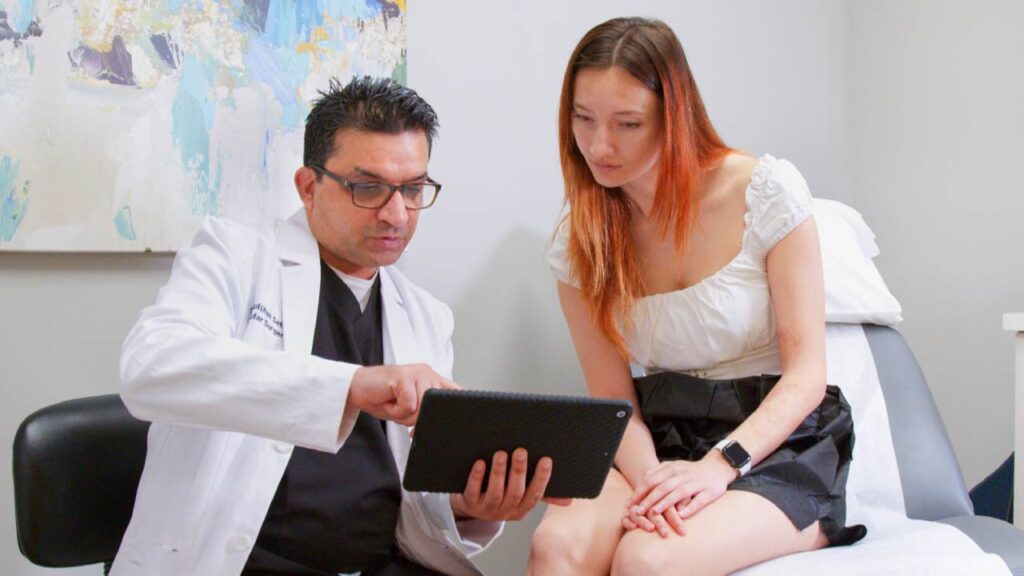Which Vein and Vascular Specialist Treats Spider Veins?
There are a few types of vein damage. One type is spider veins, or telangiectasias. These blood vessels are visible through the skin, and they’re usually red, blue or purple. They often develop as small clusters of veins, radiating from a central point. They can resemble a spider’s legs, spindly and creeping across the skin, hence their name. The best doctor for spider veins is a phlebologist or vein specialist. Spider veins don’t require surgery, so a minimally invasive vein treatment is best. Book an appointment with our Harvard-trained spider vein doctors for quick and painless treatment.

What Is a Varicose Vein Doctor Called?
Varicose veins are usually larger than spider veins, and they tend to bulge beneath the skin. Unlike spider veins, they often form in a single line instead of a cluster. Varicose veins are twisted and look rope-like rather than spider-like. They are often blue, purple, or green. Varicose veins and spider veins can develop anywhere, but they are both common in the legs and lower extremities, and you’ll learn why in the next section. For varicose veins, see a vein specialist or phlebologist. Most varicose veins don’t require vascular surgery anymore. But a small percentage of them do. So, choose a team of vein doctors in New York who offer a wide range of varicose veins treatments.
Which Vein Doctors Know How to Get Rid of Veiny Legs?
Varicose veins and spider veins are not exclusive to the legs, but they often develop there. That’s because surface vein damage is often caused by valve failure in a deeper vein. Valve failure is more common in legs veins, because they pump blood against gravity from the feet to the heart, while resisting your body weight.
Valves must close tightly to keep blood flowing toward the heart. If a valve weakens or fails, blood flows in reverse, causing blood to collect beneath the valve. This creates pressure that either causes tiny new spider veins to branch out from the overburdened vein, or varicose veins to bulge and contort at the skin’s surface. The result is the “veiny legs” that are common as we age.
If you have valve failure, you can’t just treat the surface damage. New varicose veins, spider veins, and unpleasant symptoms will develop until you treat the broken valve. Patients who don’t treat the valve develop Chronic Venous Insufficiency, a common disease that produces ongoing vein issues. Diagnosis and treatment of this disease are easy and minimally invasive when you choose the right vein doctors. You need a minimally invasive vein specialist with ultrasound training. These doctors can find and treat vein disease and damage with tiny instruments in under 30 minutes.
Which Doctor Treats Varicose Veins in Neck?
Varicose veins don’t only occur in the legs. But if you have a bulging neck vein, it’s not necessarily varicose. The neck area has thinner skin and fewer fatty layers than the legs. It’s not uncommon to see a vein bulging in the neck, even if it’s healthy. If your neck vein appears larger after exercise, hot showers, or stress, it might be a normal vein. But it’s best to check with a minimally invasive vein doctor.
Veins enlarge naturally when blood pressure rises and shrink when blood pressure lowers. But, if the vein looks twisted or larger than other veins in your neck, or if you have symptoms, it might be varicose. A minimally invasive vascular doctor will use ultrasound technology to determine whether your neck vein needs treatment. If so, they’ll consider alternatives to varicose vein surgery.
Which Doctor Performs Varicose Veins Treatment by Surgery?
Vascular surgeons perform surgical varicose veins treatments. These are no longer a first line of vein treatment. Many vascular surgeons now operate on arteries but use less invasive measures for veins. Veins are located closer to the surface of the skin, and they are lined with valves that control blood flow. As such, they are both easier to access, and easier to safely treat without surgery. If you have vein issues, choose a surgeon that also treats veins without surgery, like Dr. Juan Montoya who is board certified as both a cardiothoracic surgeon and a minimally invasive vein specialist.
Do I Need Surgical Treatment for Varicose Veins?
No, most patients do not need surgical treatment for varicose veins. A small number of patients with blood clots or severe tortuosity in their veins might need surgery, but most veins can be treated non-surgically. Less invasive methods, like vein injections and thermal energy treatments, have largely replaced vein surgery for treating varicose veins. Read about these innovative vein treatments in the next section.
What Is a Vein Dr. Called for Noninvasive Vein Treatments?
Noninvasive vein treatments include compression stockings and surface lasers. Compression stockings can reduce symptoms like cramping and swelling in some patients, but they can’t eliminate vein damage or vein diseases. Surface lasers can fade small spider veins in areas with thin skin, like the face. But they can’t treat varicose veins, vein disease, or large spider veins in the legs.
The best treatment for most veins is minimally invasive, not noninvasive. These treatments go beneath the skin, but don’t involve large incisions, surgery, or general anesthesia. For example, sclerotherapy injects medication into veins through tiny injection sites. And endovenous laser ablation closes veins with tiny fibers and thermal energy. These procedures close veins with minimal risk and zero recovery time.
Can the Best Vein Doctor Show Me How to Take Care of Veins?
The best vein doctors won’t just treat blood vessels, they’ll also teach you how to take care of veins. This includes maintaining a healthy weight, exercising, and changing positions if you remain seated or standing for long periods. They’ll advise you on elevating your legs while resting, wearing compression stockings, and how to tell when a vein is unhealthy.
Who Knows How to Prevent Varicose Veins and Spider Veins?
Vein doctors know how to prevent more varicose veins and spider veins. One way they do this is by treating underlying causes like Chronic Venous Insufficiency. But varicose veins and spider veins run in families, particularly in women. Since factors like genetics and gender play a role, vein doctors can’t prevent all vein damage. See a vein doctor at the first sign of trouble to minimize damage to your circulatory system.
Who Are the Best Varicose Vein Surgeons Near Me in New York?
The best varicose vein surgeons in New York include Dr. Juan Montoya, a renowned cardiothoracic surgeon. However, Dr. Montoya and his colleagues favor minimally invasive procedures when possible. While Dr. Montoya uses surgery on certain complicated varicosities, he’s known for preventing surgery with innovative vein medicine. He’s surrounded by a team of groundbreaking vein doctors, including Dr. Michael Nguyen, a thought leader in minimally invasive vein medicine and a co-founder of our vein clinics.
Who’s the Best Minimally Invasive Vein Doctor Near Me in NY?
The top minimally invasive vein doctors in New York are Dr. Michael Nguyen, Dr. Juan Montoya, Dr. Andrew Cortes, and Dr. Sareh Rajaee. These vein specialists are Harvard-trained and hold multiple board certifications. They contribute to lectures and medical textbooks, and train other physicians in their techniques. If you’re wondering what kind of doctor specializes in veins, visit our premier vein clinic. Our vein specialists are experts in all the latest vein treatments.





